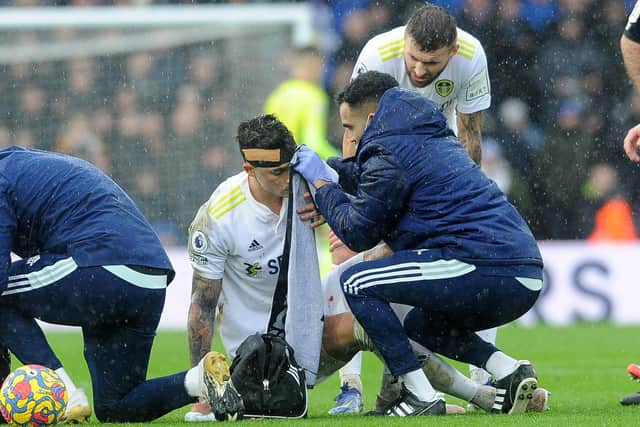The problem with Marcelo Bielsa's head injury analysis after Leeds United's Robin Koch incident
and live on Freeview channel 276
Bielsa mounted a strong defence of the Whites’ conduct from the moment Koch went down under Scott McTominay’s challenge at Elland Road on Sunday, explaining how no symptoms of concussion were immediately evident so he could return to the pitch. Had any presented, of course, he would have been withdrawn and replaced with a permanent concussion substitute.
Koch was informed that should his symptoms change, the correct course of action was to sit down and await medical treatment, which he did.
Advertisement
Hide AdAdvertisement
Hide AdThere’s no doubting any of that; Bielsa is a stickler for rules and Rob Price is as experienced and well respected a medical expert you could find in football. The problem with what Bielsa said in his analysis of the incident was the suggestion that head injuries should not be dramatised. You can understand where he’s coming from; it’s a serious issue that should be dealt with and discussed with the appropriate sobriety.
Football doesn’t appear to be listening to the most sober and serious of voices on the topic, however, so if it takes shouting and screaming from the Professional Footballers’ Association, Chris Sutton or anyone else with a wholly justified stake in the matter, so be it.
It’s five years since rugby union introduced their mandatory 10-minute, off-field screening for head injuries and three since they upped that to 12 minutes. Football is yet to follow suit. Players can be assessed on the pitch and, while they can also be checked out at half-time if the incident occurs in the first half, there is no demand for a lengthy assessment away from the urgency and pressure of the play in the immediate aftermath.
As Bielsa rightly points out, symptoms can wait hours and hours before revealing themselves and even a 12-minute assessment might have come and gone without a concussion becoming clear for Koch, but football has so much to lose by allowing players to re-enter play so quickly and players could have years to gain by sitting out for longer after each and every bang to the head.
Advertisement
Hide AdAdvertisement
Hide AdThe horrors of brain trauma are now so much more high profile than ever before and the cautionary tales from other sports would be haunting enough were it not for the sad stories of ex-footballers like Ernie Moss and Jeff Astle whose families have campaigned bravely over the link between football and dementia.


In a game at Elland Road, Sheffield United’s George Baldock flew into a challenge on Leeds United striker Tyler Roberts and took a sickening bang to the head. The Blades followed the protocols, Baldock passed them and then left the game with blurred vision.
That incident prompted Alan Shearer and a brain injury charity to issue a desperate, urgent plea for temporary concussion substitutions so players could be sat down and assessed properly - something the medical team at Leeds have long been in favour of.
That incident took place in April 2021. We’re not far off a year on and appear no closer to the introduction of temporary substitutes.
Advertisement
Hide AdAdvertisement
Hide AdIf football continues to have its head in the sand then the only options are for more voices to make more noise and more drama until progress is made.
It should also be noted that clubs have it in their power to go above and beyond the Premier League protocols. Just because they can go back on does not mean they should. The needless substitution of a player is a regret that can be stomached. Permanent damage to a player’s health is not. If it sounds dramatic, it’s because it is. Better that, though, than tragedy.
Comment Guidelines
National World encourages reader discussion on our stories. User feedback, insights and back-and-forth exchanges add a rich layer of context to reporting. Please review our Community Guidelines before commenting.